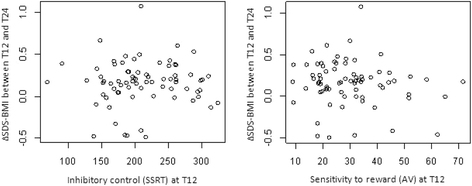The association of self-regulation with weight loss maintenance after an intensive combined lifestyle intervention for children and adolescents with severe obesity
- PMID: 28451439
- PMCID: PMC5404304
- DOI: 10.1186/s40608-016-0140-2
The association of self-regulation with weight loss maintenance after an intensive combined lifestyle intervention for children and adolescents with severe obesity
Abstract
Background: Knowledge is limited on the role the ability to self-regulate plays in the long-term outcome of obesity treatment in children and adolescents with severe obesity. The purpose of this study was to determine whether the ability to self-regulate after an one year intensive, partly inpatient, combined lifestyle intervention is associated with weight loss maintenance in children and adolescents with severe obesity.
Methods: One hundred twenty participants (8-19 years) with an average SDS-BMI of 3.41 and their parents/caregivers were included in an intervention study. As primary determinant of weight loss maintenance, general self-regulation ability was evaluated using two behavioral computer tasks assessing inhibitory control and sensitivity to reward.
Results: There was no association between inhibitory control at T12 and ∆SDS-BMI between T12 and T24 (β = 0.0002; CI 95% = -0.0010-0.0014; P = 0.761). There was also no relation between sensitivity to reward at T12 and ∆SDS-BMI between T12 and T24 (β = -0.0028; CI 95% = -0.0075-0.0019; P = 0.244). None of the psychosocial factors that were examined as moderators, showed a statistically significant interaction, except for parental feeding style (P = 0.023).
Conclusions: The ability to self-regulate after an intensive, partly inpatient, multidisciplinary one year intervention for severe obesity in children and adolescents was not associated with the ability to maintain the achieved weight loss during the following year. Factors that explain the large range of long term outcomes need to be elucidated.
Trial registration: Netherlands Trial Register (NTR1678, registered 20-Feb-2009).
Keywords: Childhood obesity; Inhibition; Reward; Self-regulation; Weight loss maintenance.
Figures


References
LinkOut - more resources
Full Text Sources
Other Literature Sources
Research Materials

